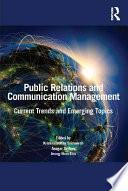A Relational Approach To the Study and Practice of Public Relations
The emergence of relationship management as a paradigm for public relations scholarship and practice necessitates an examination of precisely what public relations achieves -- its definition, function and value, and the benefits it generates. Promoting the view that public relations provides value to organizations, publics, and societies through relationships, Public Relations as Relationship Management takes a in-depth look at organization-public relationships and explores the strategies that can be employed to cultivate and maintain them. Expanding on the work published in the first edition, this thoroughly up-to-date volume covers such specialized areas of public relations as non-profit organizations, shareholder relations, lobbying, employee relations, and risk management. It expands the reader’s ability to understand, conceptualize, theorize, and measure public relations through the presentation of state-of-the-art research and examples of the use of the relationship paradigm. Developed for scholars, researchers, and advanced students in public relations, Public Relations as Relationship Management provides a contemporary perspective on the role of relationships in public relations, and encourages further research and study.
Expanding on the work published in the first edition, this thoroughly up-to-date volume covers such specialized areas of public relations as non-profit organizations, shareholder relations, lobbying, employee relations, and risk management.










